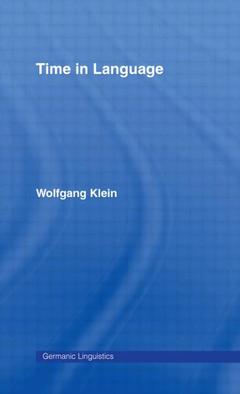Description
Time in Language
Author: Klein Wolfgang
Language: English
Subject for Time in Language:
Keywords
lexical; content; topic; finite; verb; temporal; relations; adverbials; source; target; Lexical Content; Vice Versa; Temporal Adverbials; Basic Time Concept; Topic Time; English Perfect; Present Perfect; Finite Verb; Finite Component; Durational Adverb; Frame Adverbials; John Sleep; Tense Forms; Noun Phrases; Room Yesterday; Temporal Relations; Apparent Oddity; Topic Focus Structure; Measure Phrase; Iterative Reading; Temporal Congruency; Declarative Main Clauses; Inherent Temporal Properties; Internal Temporal Organization; Consecutio Temporum
Support: Print on demand
Description
/li>Contents
/li>Biography
/li>Comment
/li>




